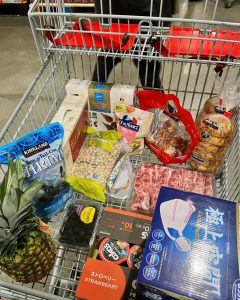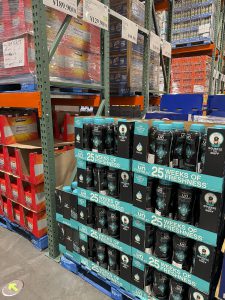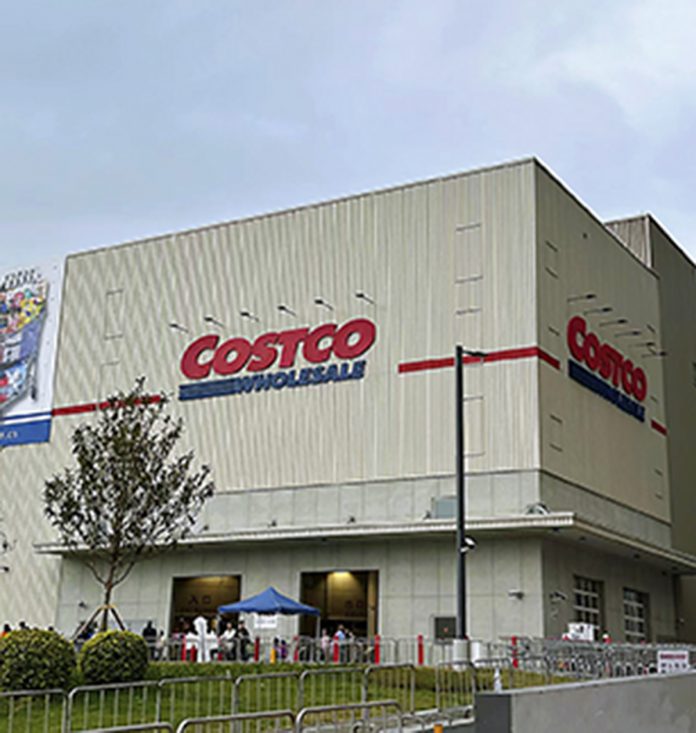Hongkongers flock to Shenzhen’s giant supermarket for cheap grocery.
By Emma Wei
Kylie Wong goes to Shenzhen for grocery shopping in giant supermarkets almost every two weeks.
“I really enjoy shopping in Shenzhen. I used to go there once a month. Now I go to Shenzhen more than two times a month after the opening of Costco,” the 32-year-old woman says.
Wong goes shopping in Shenzhen for cheaper food and daily necessities such as bread, yogurt, and fruits even though it takes two hours from her home to the supermarket.
“I usually spend RMB¥1,500 (US$207.54) on food and fresh meat. It costs me twice the price if I buy them in Hong Kong,” she says.
She buys fruit like strawberries, blueberries and food at a cheaper price in Shenzhen and then carries them back to Hong Kong.
“The cost of living in Hong Kong is very high. I prefer doing my grocery shopping in Shenzhen as the quality of products is the same as those in Hong Kong, but they are much cheaper,” she says.
“Buying food is a good deal as large-sized packages are available. Although houses in Hong Kong are very small, I still try to stock up on as much food as possible,” she says.

Kelly Wong buys some food and daily necessities like meat, pineapple, masks.
Lu Mao-ting also loves grocery shopping in Shenzhen even if it takes him about an hour and a half to get there from his home.
“I loved shopping in Costco when I was studying in America. It’s great that there is a branch in Shenzhen!” Lu, who lives in Mong Kok, says.
He finds that some daily necessities and food in the giant supermarket are cheaper. “A piece of cake in Hong Kong costs HK$50 (US$6.39), but I can buy a whole cake at the same price in Shenzhen,” he says.
“Although I haven’t tried the taste here yet, I will probably buy it again because of this price,” he adds.
According to the Hong Kong Immigration Department, 53.34 million Hong Kong residents travelled to mainland China, with over 40 million leaving through the Shenzhen Hong Kong port in 2023.
Opened on January 12, 2024, Costco has launched some promotional campaigns to draw more crowds to the supermarket.

Wholesale retailer Costco sells goods in bulk.
“The original annual membership fee is RMB¥299 (US$41.37) but there was a discount before the opening of Costco that it took only RMB¥199 (US$27.53) between September 2023 and January 12, 2024,” the sales manager of the mega supermarket surnamed Wu says.
About 90,000 customers applied for membership online before the supermarket was open, and Hong Kong applicants count for 10 percent.
The total revenue of Costco’s six branches in China reached RMB¥57.8 billion (US$7.99 billion) in the first quarter of 2024, according to Costco China financial report.
“We have also launched some products with Cantonese characteristics that cater to the tastes of Hong Kong people. For example, a vacuum package of a popular dish from Guangzhou Restaurant. The convenient packaging allows Hong Kong customers to enjoy food at home when they want to,” Wu says.
Marketing Manager Annie Suen of Wellcome Supermarket admits that Costco’s opening in Shenzhen has affected business in Hong Kong.
“Fewer customers are coming to our branches after Costco has opened, especially during weekends,” Suen says.
“There is no significant change in the sale volume of vegetables and fresh meat, but daily necessities and cooked food show a downward trend,” she says.
Associate Professor Bai Ying from the Department of Economics at the Chinese University of Hong Kong believes that the opening of giant supermarkets such as Costco and Sam’s in Shenzhen will influence Hong Kong’s economy in the long run.
“The opening of those mega supermarkets has helped some Hong Kong residents cut down living costs. Looking ahead, this will make the local economy decline,” Bai says.
He points out that the biggest factor affecting consumption is price but the problem cannot be solved in Hong Kong easily because of the sky-high rent.
“The competition between Hong Kong and the mainland China markets can also be complimentary to each other leading to better products and services,” he adds.
Edited by Nicole Li and Perry Kwok
Sub-edited by Cynthia Hu







































